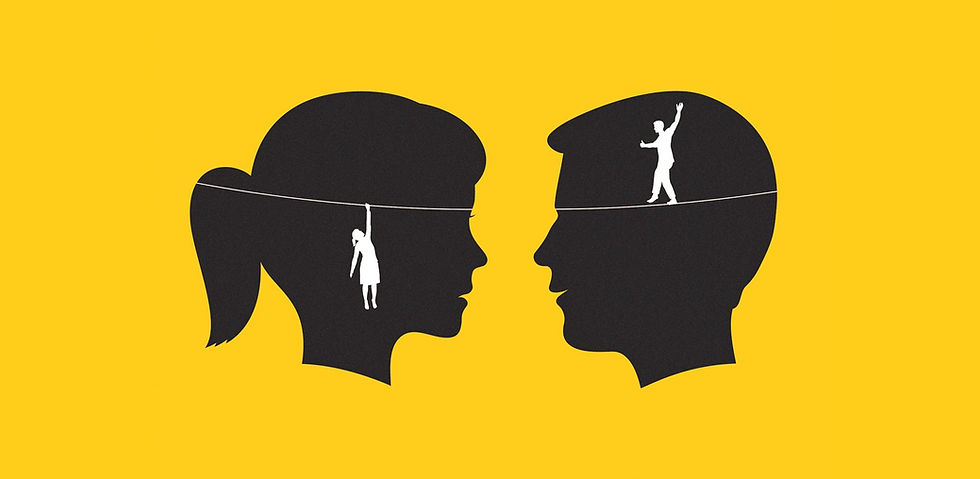The Confidence Gap: the Consequence of a Self-Fulfilling Prophecy
- Reinvented Magazine

- May 25, 2019
- 3 min read
Written By: Madeleine Salem
Dr. Anna Powers, scientist and founder of Powers Education, once said in an interview for Thrive Global, "I often hear women say 'I can’t do math' or 'I am not good at science'. But in saying that, young women immediately limit themselves by erecting a boundary on their potential, which is simply not true."
This festering problem being observed in women can be attributed to the social-psychological theory of the self-fulfilling prophecy: a belief that comes true because one acts as if it is already true.
Popular media has often presented men as the face of STEM jobs: male scientists, male engineers, male programmers, as found by the Geena Davis Institute. Now, there's nothing wrong with men working in STEM fields - the problem lies in the representation of men as the only people working in STEM fields. The young girls that see this may grow up to think that they are simply not suited to pursue careers in science and math, even if they have a natural talent for or interest in those subjects. And the unintended consequence of this is something called the Confidence Gap.
Women in a vast number of professions have been observed to have markedly less confidence in their competence and possibility of success than their male peers. Dr. Wiebke Bleidorn of the University of California, after conducting a study that indicates that this confidence gap between men and women is present not just in the United States, but the whole world, speculates that the difference may just have biological causes, as "most personality traits have a genetic basis."
Psychological theories about the predispositions of men and women can be used to support the view that the Confidence Gap may be rooted in the innate differences between genders.
Cognitive psychologist Carol Gilligan has suggested that men have a hardwired focus on justice, laws, and principle, while women are more inclined to focus on nurturing, developing relationships, and fulfilling human needs. Because women have a natural tendency to put others before themselves due to their motherly instincts, it is expected that they would generally have lower levels of self-esteem, and thus lower levels of self-efficacy, or the belief that one has in her own ability to succeed.
The psychological effects of early maturation and development in girls and boys also tend to manifest differently - whereas boys that mature early tend to develop a greater sense of self-confidence and appear more attractive to and are more popular with their peers, girls that mature early are more likely to develop mental illnesses and a negative self-concept.
The natural difference in confidence between men and women may have been further reinforced by psychological factors, for example: the societal conditioning that has led many women to believe that they don't belong in more "prestigious" professions; the learned helplessness phenomenon, in which women may become discouraged after hearing the stories of those such as Rosalind Franklin, whose contributions to the discovery of the double helix model of DNA were mostly overshadowed by that of her male competitors; and the double standard pointed out by Forbes, in which women who try to establish themselves in powerful leadership positions may be labeled as "bossy" while men who act similarly may instead be labeled as "assertive."
The Confidence Gap may certainly be part of the reason as to why we see such an underrepresentation of women in STEM. Cornell psychologist David Dunning and Washington State University psychologist Joyce Ehrlinger conducted a study in 2003 in which they invited students to participate in a science competition for the chance to win prizes. They found that while 71% of the male students that were asked accepted the invitation, only 49% of female students that were asked did the same.
In an interview with The Atlantic, Ehrlinger said that the results reflected whether or not women would seek out certain opportunities. "Because [women] are less confident in general in their abilities,” she explained, “that led them not to want to pursue future opportunities."
There is no real solution to the problem that is the Confidence Gap. We can only bring awareness to the issue in the hopes that everyone, men and women alike, will begin to recognize its happenings in the workplace and take action, whether it be men amending their preconceived biases or women taking it upon themselves to challenge the limiting expectations society has imposed on them.
Hopefully, with this knowledge reaching a wider audience of people, we can begin to move forward towards achieving true equality between men and women in the STEM workplace, in STEM professions and beyond.
.png)



